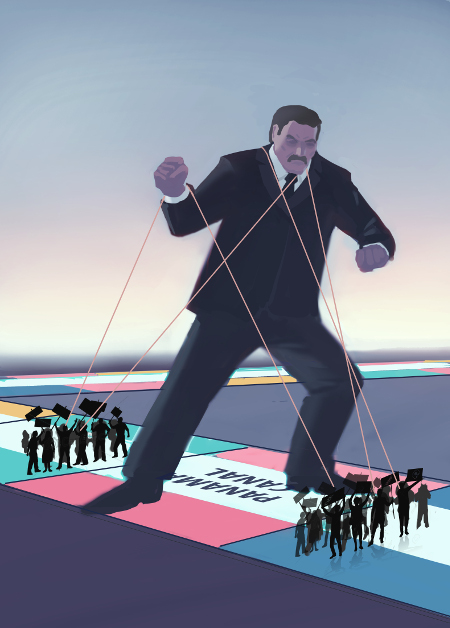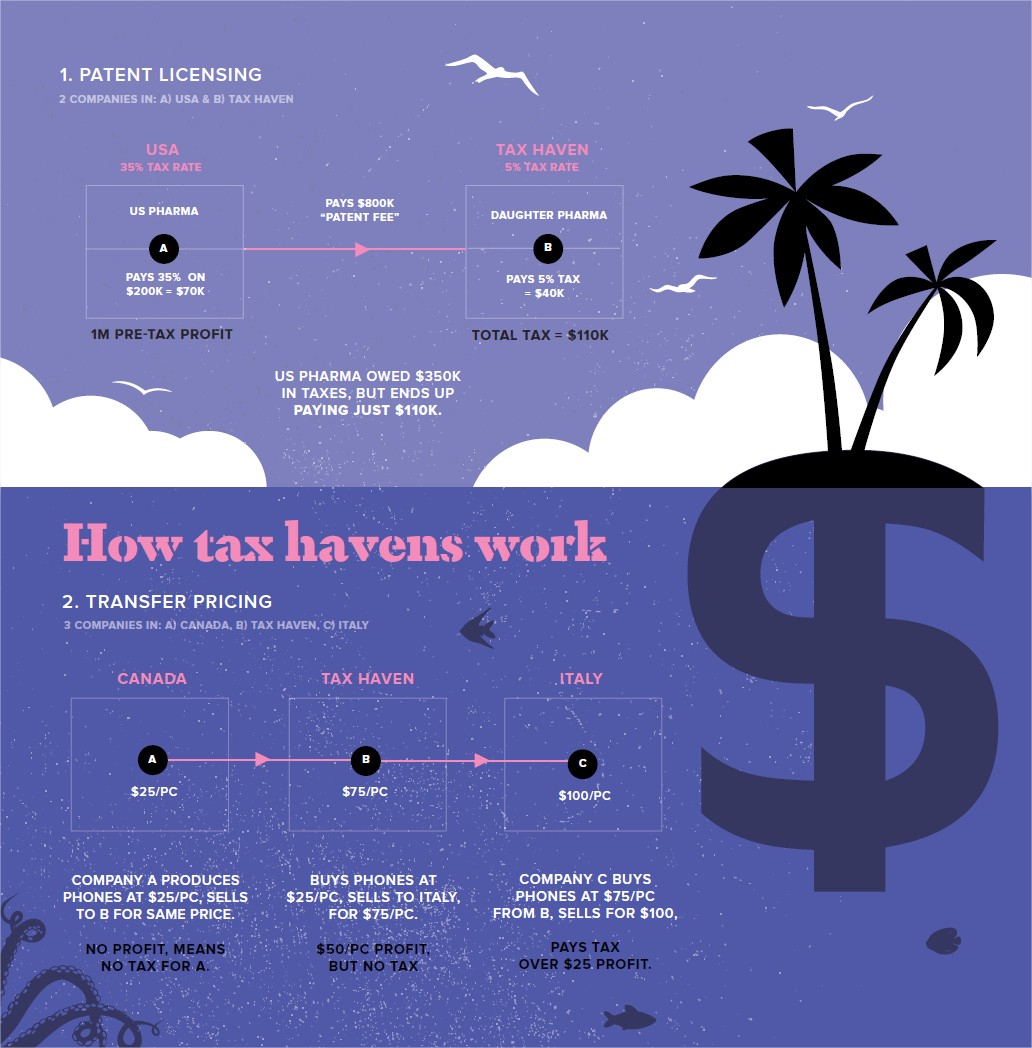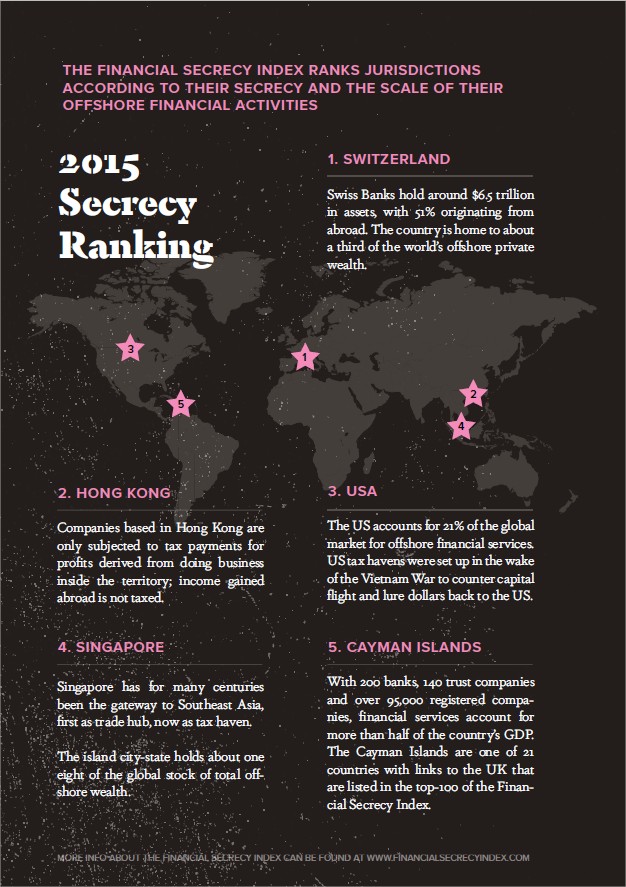Tax Havens
By exposing the sheer scale of offshore finance, the Panama Papers have re-fuelled global resentment towards tax-avoiding elites. Are the rich immoral?
The 1 Percent Under Siege?
- Issue #3
- Author
Years before the Panama Papers broke, many of the world’s richest people felt unappreciated and under attack. In 2014, Silicon Valley venture capitalist Tom Perkins compared the position of the rich to that of the Jews in 1930s Germany, warning of a “progressive Kristallnacht” and “a rising tide of hatred of the successful 1 percent.” Though a few of his fellow billionaires distanced themselves from these remarks, several jumped vigorously to his defense, expressing their agreement that the rich were being “pummeled” and “picked on.”
 The failure of some parts of the public to buy the “wealth creators” narrative — that being rich is the just reward for risk-taking that benefits everyone by creating jobs and prosperity — was shocking and hurtful to people who saw themselves as our benefactors. In lieu of the unadulterated public gratitude and recognition they were expecting, they found resentment and criticism in the form of the Occupy Wall Street movement and its offshoots. The response by the rich, with few exceptions, was defensiveness and anger, a “toxic mélange of entitlement and shame.”
The failure of some parts of the public to buy the “wealth creators” narrative — that being rich is the just reward for risk-taking that benefits everyone by creating jobs and prosperity — was shocking and hurtful to people who saw themselves as our benefactors. In lieu of the unadulterated public gratitude and recognition they were expecting, they found resentment and criticism in the form of the Occupy Wall Street movement and its offshoots. The response by the rich, with few exceptions, was defensiveness and anger, a “toxic mélange of entitlement and shame.”
The noisier aspects of this “sore winner” syndrome died down for a while, but the Panama Papers seem to have catalyzed a revival. For many observers, the 11.5 million documents that have come to light from the wealth management firm Mossack Fonseca have reopened the case for grievance against the rich — this time, on a much broader scale. As the Panama Papers have shown, the problem is not just income inequality; it is about wealth inequality. And it is not just about corporate executives; the rogue’s gallery of people exposed in the leak includes everyone from heads of state, to celebrities and sports stars. They constitute a global elite in multiple domains, and the scale of their wealth dwarfs the problem of outsized CEO pay.
 Of course, the problem is not just a matter of individual action or individual morality: inequality and tax avoidance are structural issues. But as I show in my new book, Capital without Borders (Harvard University Press), those structures are created by and for the world’s wealthiest people. Government leaders of the sort named in the Panama Papers have considerable authority over the forms that financial structures take, and the uses to which they can be put. For elites who do not hold public office there are numerous channels to make their voices heard above those of everyone else; many offshore states literally write their laws and run their day-to-day government business primarily to attract the custom of the rich, with the interests and rights of local people a mere afterthought.
Of course, the problem is not just a matter of individual action or individual morality: inequality and tax avoidance are structural issues. But as I show in my new book, Capital without Borders (Harvard University Press), those structures are created by and for the world’s wealthiest people. Government leaders of the sort named in the Panama Papers have considerable authority over the forms that financial structures take, and the uses to which they can be put. For elites who do not hold public office there are numerous channels to make their voices heard above those of everyone else; many offshore states literally write their laws and run their day-to-day government business primarily to attract the custom of the rich, with the interests and rights of local people a mere afterthought.
The history and origins of the offshore system itself are a testament to the power of elite agency. As a superstructure in the global political economy, offshore was created essentially as a convenience for the rich to help them get even richer from global trade by working around legal constraints (not just tax, but currency controls and other regulations) that held back everyone else. As the journalist and offshore expert Nicholas Shaxson has observed, “offshore is a project of wealthy and powerful elites to help them take the benefits from society without paying for them.”
 Thus, the moral issue raised by tax avoidance and the Panama Papers is not just who uses and benefits from the international financial system, but who created it in the first place. We learned from Oxfam earlier this year that 1 percent of the world’s population now owns 50 percent of its wealth. But not until the Panama Papers did we get a look at the faces of that global 1 percent. That personalization of inequality — linking real people to a problem so huge it can feel like an abstraction — seems to have catalyzed a renewal of the great debate: are the rich “immoral”? Are they bad people who need to be stopped?
Thus, the moral issue raised by tax avoidance and the Panama Papers is not just who uses and benefits from the international financial system, but who created it in the first place. We learned from Oxfam earlier this year that 1 percent of the world’s population now owns 50 percent of its wealth. But not until the Panama Papers did we get a look at the faces of that global 1 percent. That personalization of inequality — linking real people to a problem so huge it can feel like an abstraction — seems to have catalyzed a renewal of the great debate: are the rich “immoral”? Are they bad people who need to be stopped?
Such questions have elicited outrage and spirited defense in some quarters. Among the wealthy individuals named in the leak, the modal response has been anger. Former Icelandic Premier Sigmundur Gunnlaugsson famously stormed out of a live television interview when he was asked about his connection to an offshore firm created by Mossack Fonseca. Juan Pedro Damiani, a member of the Ethics Committee for the embattled FIFA, the governing organization for global soccer, lashed out at reports linking him to offshore structures created by the Panamanian firm, calling the allegations “ridiculous” and “outrageous.” Former British Prime Minister David Cameron was “angry” at the way the leak exposed him and his family to public condemnation — including being dubbed “dodgy Dave” by his colleague, the Speaker of the House of Commons.
We will likely see much more of this as future leaks expose more individuals to global public scrutiny of what they thought were private financial matters. So far, little evidence of formally illegal activity has been uncovered. Instead, the public opprobrium seems to be directed at unethical use of power. In particular, what galls observers is elites’ use of offshore finance to “take the benefits from society without paying for them.”
Taking social benefits without accepting responsibilities? If that sounds familiar, you may recall them as the terms of condemnation usually applied to “welfare queens.” Nobel Prize-winning economist Paul Krugman has gone farther with this analogy, saying that the 1 percent are afflicted by “pathology” and “extreme spiritual damage.” The use of “pathology” here should ring a bell: there is a long history association of associating the poor with a “tangle of pathology.” What we are seeing now is the wealthy being tarred with the same brush that has been applied to the poor for more than a century. Elites accustomed to enjoying public respect and even admiration are suddenly being portrayed in an unfamiliar light.
 For example, a highly placed member of the opposition in the UK government tweeted that David Cameron was “immoral” for profiting from offshore tax avoidance. Public commentary on news of the Panama Papers included numerous descriptions of Cameron’s fellow travelers in the Panama Papers — such as actor Jackie Chan and soccer star Lionel Messi — as “lazy deceptive thieves.” This is not too far removed from the terms used to describe poor people, long thought to be “prone to lie and steal, and generally opposed to self-reliance.”
For example, a highly placed member of the opposition in the UK government tweeted that David Cameron was “immoral” for profiting from offshore tax avoidance. Public commentary on news of the Panama Papers included numerous descriptions of Cameron’s fellow travelers in the Panama Papers — such as actor Jackie Chan and soccer star Lionel Messi — as “lazy deceptive thieves.” This is not too far removed from the terms used to describe poor people, long thought to be “prone to lie and steal, and generally opposed to self-reliance.”
If we were to take seriously the idea that many of the claims about the alleged “moral failings” of the poor are actually true of the wealthiest members of society, what should be done? Some have suggested the logical extension of the “welfare queen” analogy, writing that “we ought to tame, shame and civilize the super-rich.” While government leaders, many of whom benefit personally from offshore finance, wrangle over formal sanctions, the Panama Papers have already brought us to Stage 1 of the informal social punishment process: naming and shaming.
In the past, as with the LuxLeaks scandal of 2013 — a much smaller but highly revealing disclosure of documents connected with tax evasion in Luxembourg — the outrage blew over quickly. While the Luxembourg leak was initially described as a “game changer” for public policy makers, it was later acknowledged that nothing really changed. Nothing except the shooting of the messenger: Antoine Deltour, the source of the leak, is now being prosecuted for theft and faces several years in prison.
On a positive note, whoever leaked the Panama Papers has been much more careful about protecting his, her or their anonymity using encrypted modes of communication. This model has kept the public conversation focused on what really matters — the data, rather than the identity and motives of those who leak it — and may encourage other well-positioned individuals within the offshore industry to come forward.
Source URL — https://roarmag.org/magazine/one-percent-tax-havens-avoidance/
Next Magazine article
Fancy Forms of Paperwork and the Logic of Financial Violence
- David Graeber
- September 21, 2016
The Rise of the American Bondholding Class
- Sandy Brian Hager
- September 21, 2016

